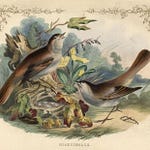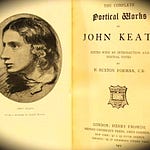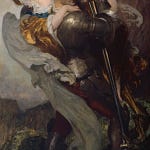Sometimes I like to think of myself as a tour guide, showing people what I’ve been given to see, and saying, “Come here, look at this! Isn’t it something?” But that’s just the beginning. And then too, sometimes I can guess that their first reaction won’t be one of wonder. If a geologist shows you a rock, you might say, “Well, hmm, a rock,” and wonder what’s so special about it, until he shows you that there are streaks of amethyst in it, and tells you how they got there, what it’s made of, and what electrical properties it has, like those that make my writing these words possible. A lot of words — which he hopes will then open out into wonder.
And then there’s love. How does a man express his love for a woman? He sings. What else? And what does that mean, if not that words alone are somehow inadequate for him? The man who never stammers, never loves. Still, you must say something.
It’s the problem that faces the lover Astrophil, in Philip Sidney’s magnificent and keenly ironic sequence of sonnets, Astrophil and Stella. The name “Astrophil” is allegorical, meaning “Star-lover,” and that’s because he’s in love with the woman allegorized as Stella, “Star.” It’s also a play on Sidney’s own name: Latin sidus means star or constellation, so that Phil Sidney can also be considered as Star-lover. But does that necessarily mean that he’s in love with a woman — and a married woman, no less? You see, when the Renaissance poets wrote their sonnets, they adopted a pose, a persona, so that what Astrophil means to say isn’t necessarily what Sidney means to say and to have us understand.
What may words say, or what may words not say, Where truth itself must speak like flattery? Within what bounds can one his liking stay, Where Nature doth with infinite agree ? What Nestor's counsel can my flames allay, Since Reason's self doth blow the coal in me ? And, ah, what hope that hope should once see day, Where Cupid is sworn page to Chastity ? Honor is honored, that thou dost possess Him as thy slave, and now long-needy Fame Doth even grow rich, naming my Stella's name. Wit learns in thee perfection to express; Not thou by praise, but praise in thee is raised: It is a praise to praise, when thou art praised.
And that dramatic irony comes forth in our Poem of the Week.
Listen to this episode with a 7-day free trial
Subscribe to Word & Song by Anthony Esolen to listen to this post and get 7 days of free access to the full post archives.













